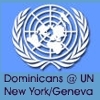

| BRIEFING - October 8, 2014 | To learn more about the Millenium Development Goals, click on the graphic Past Briefings: Sept 10, 2014 July 16, 2014 July 2, 2014 June 18, 2014 June 4, 2014 May 7, 2014 April 9, 2014 March 19, 2014 March 5, 2014 Feb 19, 2014 Jan 8, 2014 Nov 22, 2013 Oct 23, 2013 Oct 9, 2013 Sept 25, 2013 Sept 11, 2013 July 10, 2013 June 26, 2013 June 12, 2013 May 8, 2013 April 24, 2013 |
|
People’s Climate March calls for UN action By Kelly Litt, Dominican Volunteer On Sunday, Sept. 21, 2014, history was made as more than 400,000 people marched through the streets of New York City to call for action and justice on climate change. This being the largest climate march in history was meant to make a loud statement to those gathering for the Climate Summit at the United Nations the following Tuesday. According to People’s Climate March, there were 2,646 People’s Climate events in 162 countries around the world. People from all over with diverse backgrounds took part in the march and surrounding events. Thousands of artists participated, hundreds of buses came from across the United States, hundreds volunteered, more than 50,000 college students marched, 29 marching bands participated, 26 city blocks were blocked off as participants marched through 80 blocks, all to speak up for our one planet. The New York Times featured four photos and an article about the march on the front page on Sept. 22. Other large news outlets also picked up the story, including TIME, BBC, NBC News, and Huffington Post. The following Tuesday, Sept. 23, 125 heads of states from across the globe gathered along with business leaders and civil society at the UN as Secretary-General Ban Ki-moon urged the world to address climate change, encouraged that ambitious steps be taken toward reducing emissions, and mobilized leaders to reach an agreement and vision that will shape the world. This Climate Summit in New York is one of a series that will be followed by a Summit in Lima, Peru in December followed by the UN Climate Summit in Paris in 2015. On Sept. 24, members of civil society hosted a reportback session to discuss all the events that had taken place regarding the People’s Climate March as well as the Climate Summit at the UN. Jamie Henn, representing 350.org, a global grassroots organization focused on climate safety and justice, explained that the organizers of the march were hoping for a turnout of 100,000 people. They were astonished when over 400,000 showed up. This huge turnout of people from New York, across the country, and around the world was due to the fact that global citizens care about their kids, they care about the future of the planet, and many worry about losing jobs due to a degrading climate and the continued rise of the fossil fuel industry. The People’s Climate March was led by frontline communities, those who are being continually affected by climate change including indigenous communities and the youth population. The march aimed to give the heads of states, politicians, and all others who gather at the UN for the Climate Summit a necessary political push to take a stand and make a move on climate change and include it in political agendas as well as in the Post-2015 Sustainable Development Goals. Secretary-General Ban Ki-moon urged governments to take action to address climate change and reminded them of the hundreds of thousands who marched and demanded that their leaders listen. Maria Theresa Nera from IBON International was one of only 38 members of civil society who was allowed into the Climate Summit at the UN on Sept. 23. She explained that while the summit aimed to put climate change back on the agenda the outcomes seem to have been more of a “show and tell” session by governments. Many governments explained what they already do or plan to do to combat climate change, but the questions still remain as to where the commitments are, where the finances are, and where the means of implementation are. Climate change is causing great injustice, disrupting life, and harming our brothers and sisters in our own neighborhoods and around the world. There are seven themes of Catholic Social Teaching which can help promote a just society. These Catholic Social Teaching themes include:
Climate injustice is negatively affecting each of these seven areas. Rooted in Catholic Social Teaching, we are urged to demand that this momentum for change is not hindered or halted.
|
Dominican Leadership Conference
Building relationships and collaborating in the mission of preaching the Gospel
29000 West Eleven Mile Road
Farmington Hills MI 48336
248-536-3234 Contact: Executive Director

